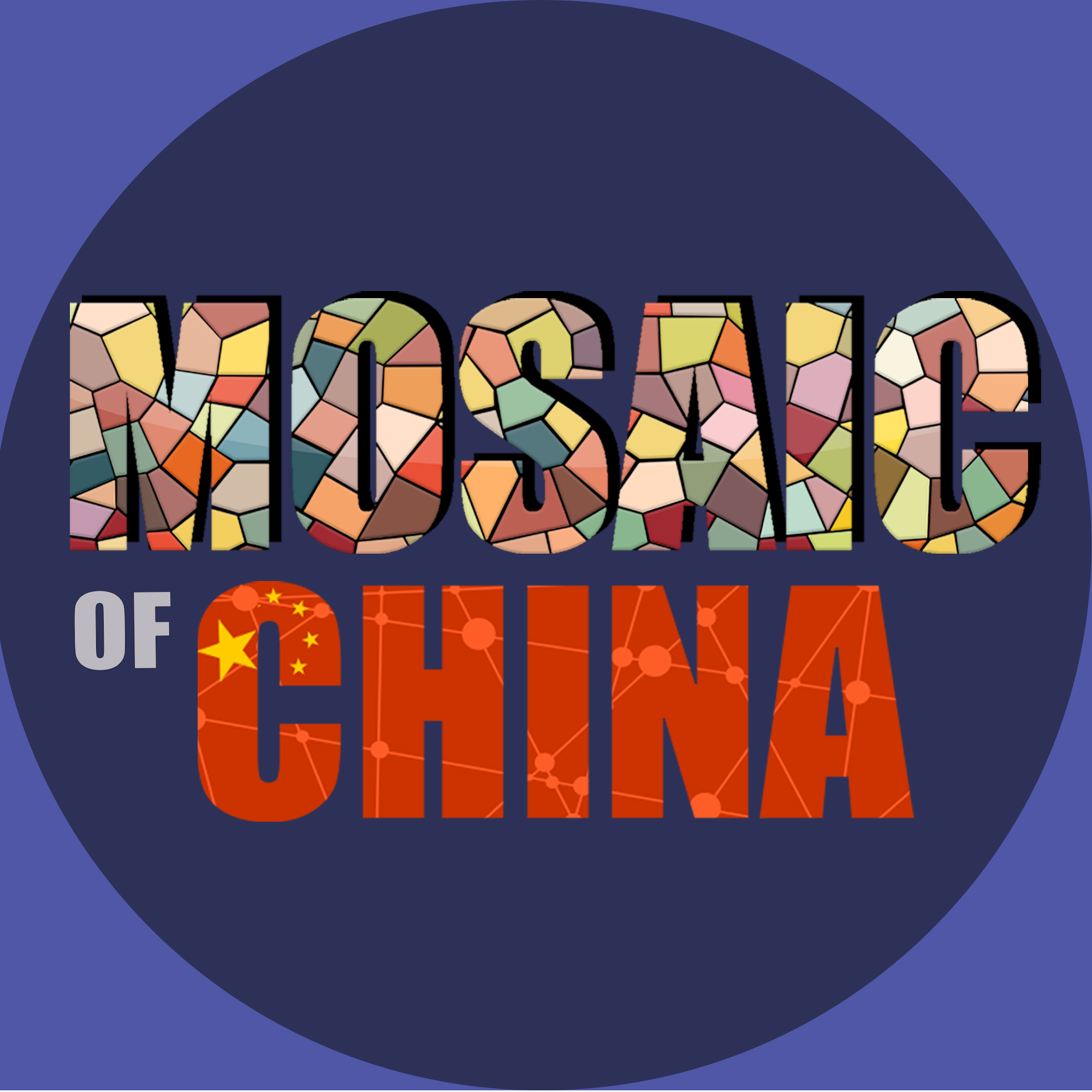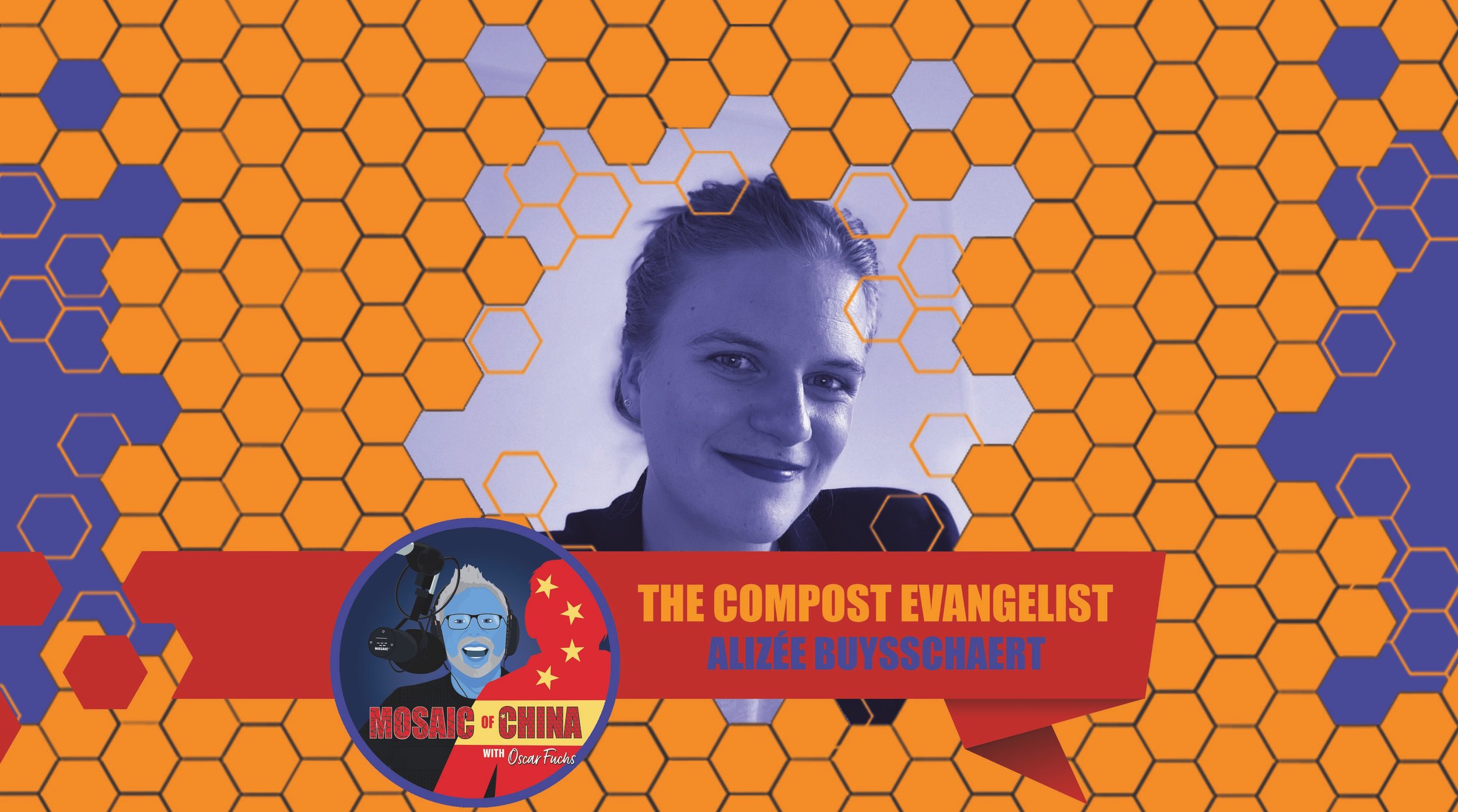Season 03 Episode 14
The details below are for the REGULAR version of this episode. For the PREMIUM version, subscribe on Apple Podcasts, Patreon (outside China) or 爱发电 (in China).
Episode 14: The Compost Evangelist
Alizée BUYSSCHAERT - Founder & Director, Zero Waste Shanghai
Original Date of Release: 13 Dec 2022.
The environment is one of those topics that we all know we need to talk about, but at the same time desperately want to avoid. None of us want to be lectured on all the things we're doing wrong, and none of us need yet another reminder about how the human race is mismanaging its impact on the planet.
So it's a breath of fresh air to have a conversation with someone who is not only passionate about the environment but also... fun. In today's episode, Alizée Buysschaert talks about the way she personally challenged herself to reduce 90% of the waste that she produced every day. And how this challenge led to a number of personal and professional reinventions.
The episode also includes catch-up interviews with Katherine WONG from Season 02 Episode 04, and Angie WU from Season 01 Episode 18.
Season 03 is supported by Shanghai Daily - the China news site; Rosetta Stone - the language learning company; naked Retreats - the luxury resorts company; SmartShanghai - the listings and classifieds app; and JustPod - the podcast production company.
To Join the Conversation and Follow The Graphics…
View the Instagram Story Highlight, the LinkedIn Post or the Facebook Album for this episode. Alternatively, follow Mosaic of China on WeChat.
To view the images below on a mobile device, rotate to landscape orientation to see the full image descriptions.
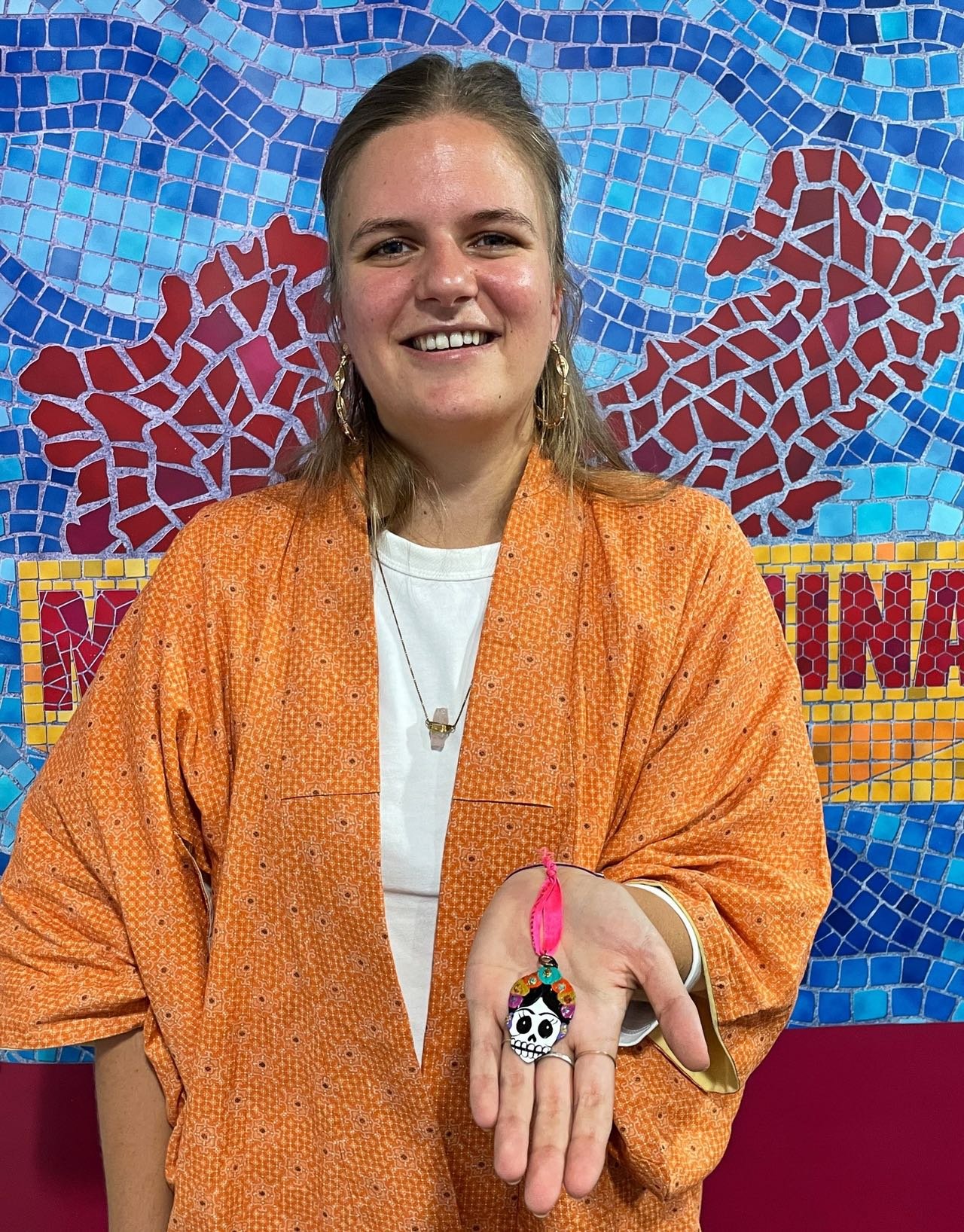
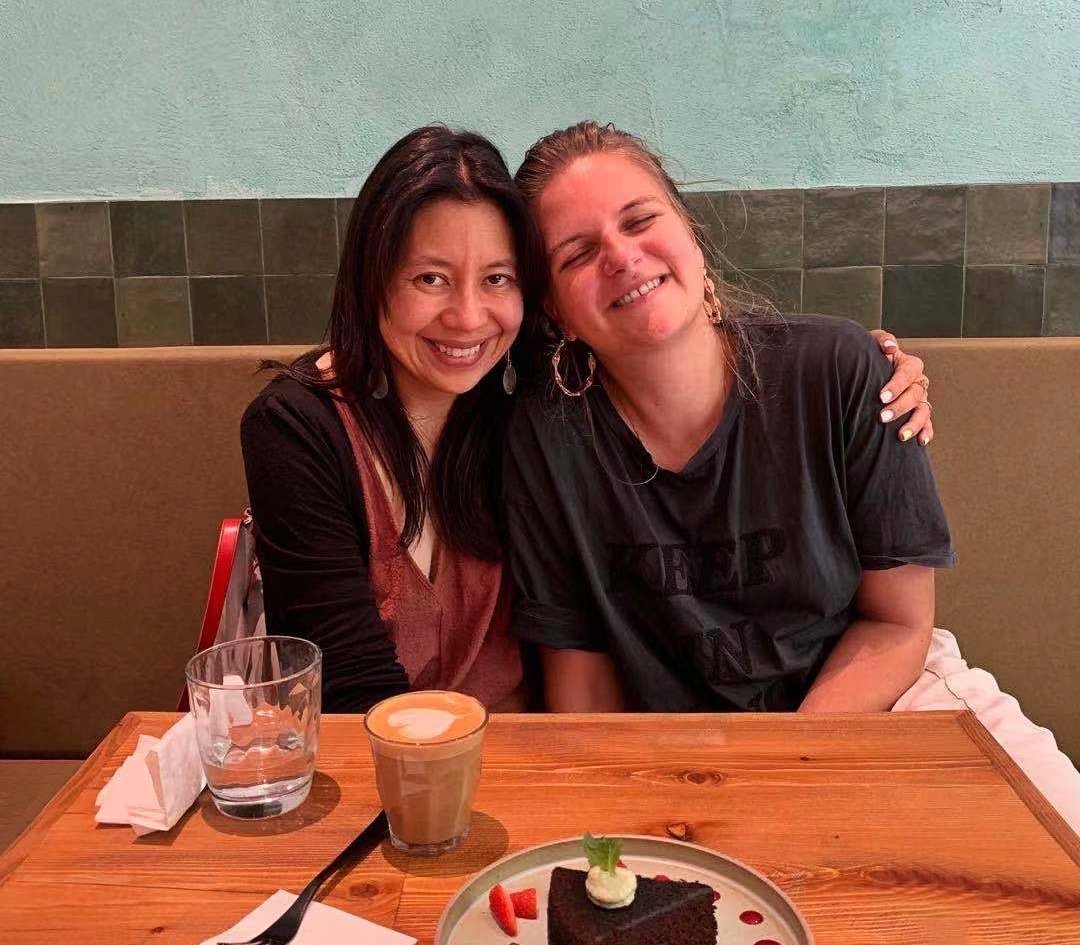
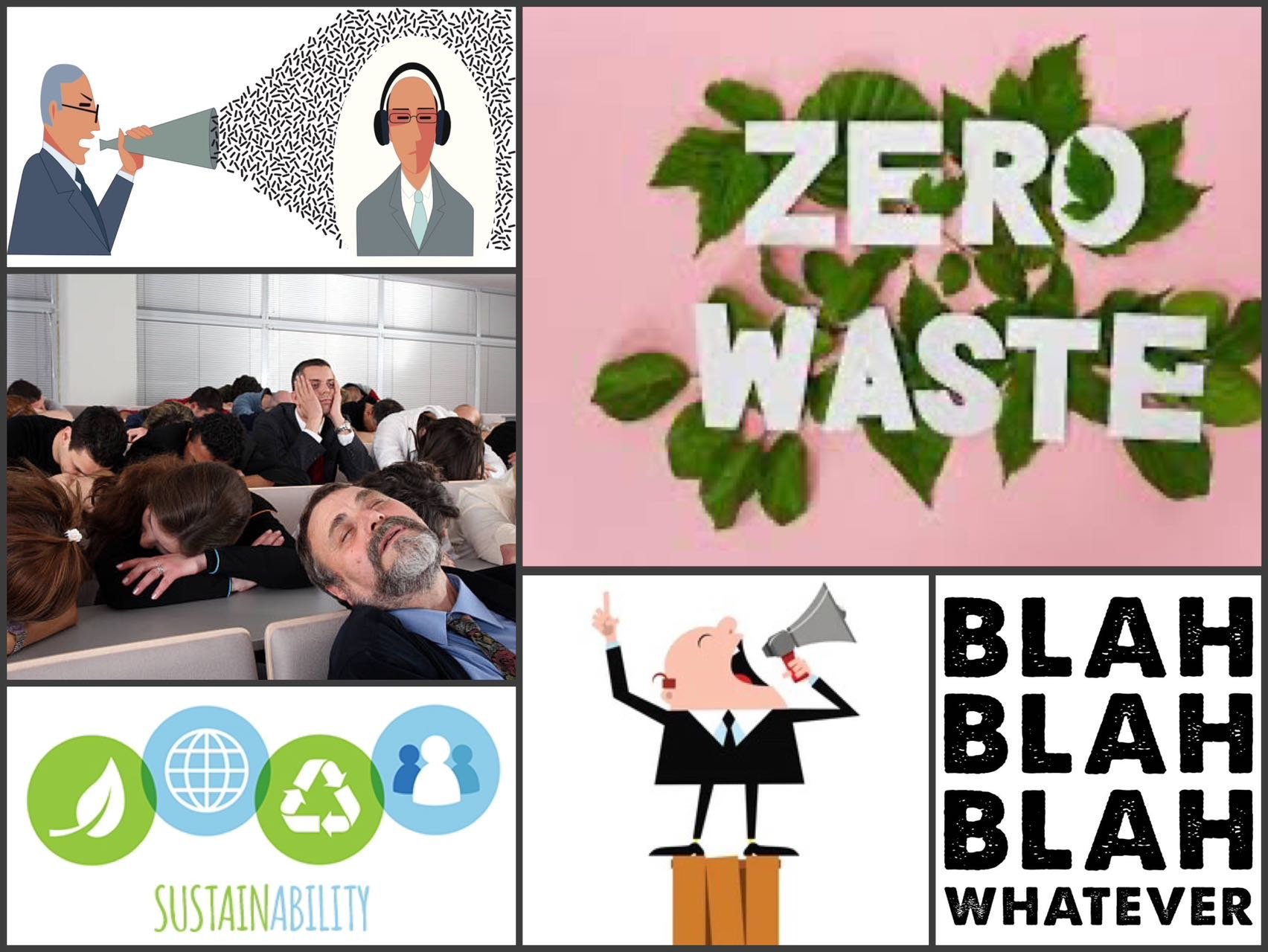
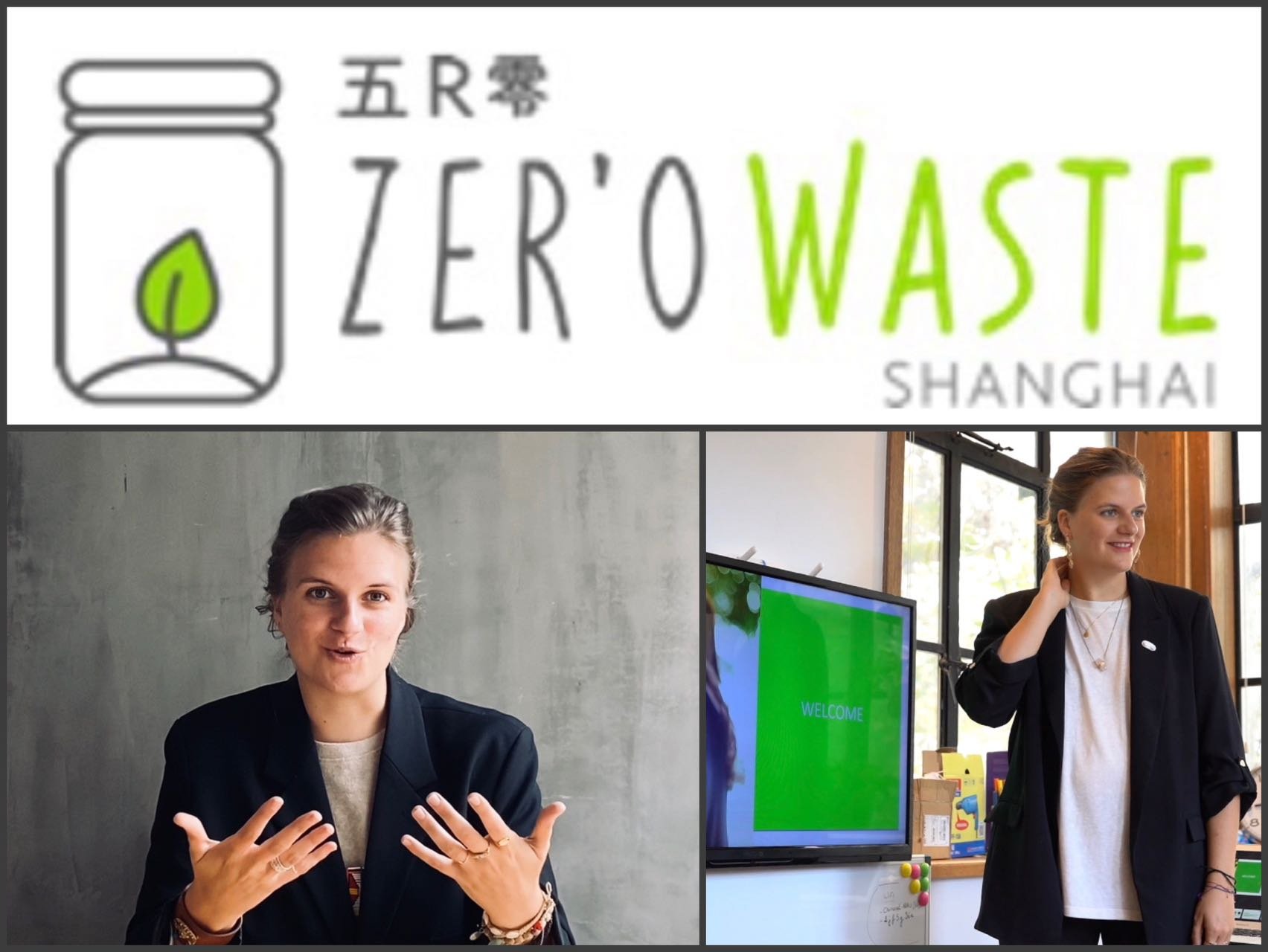
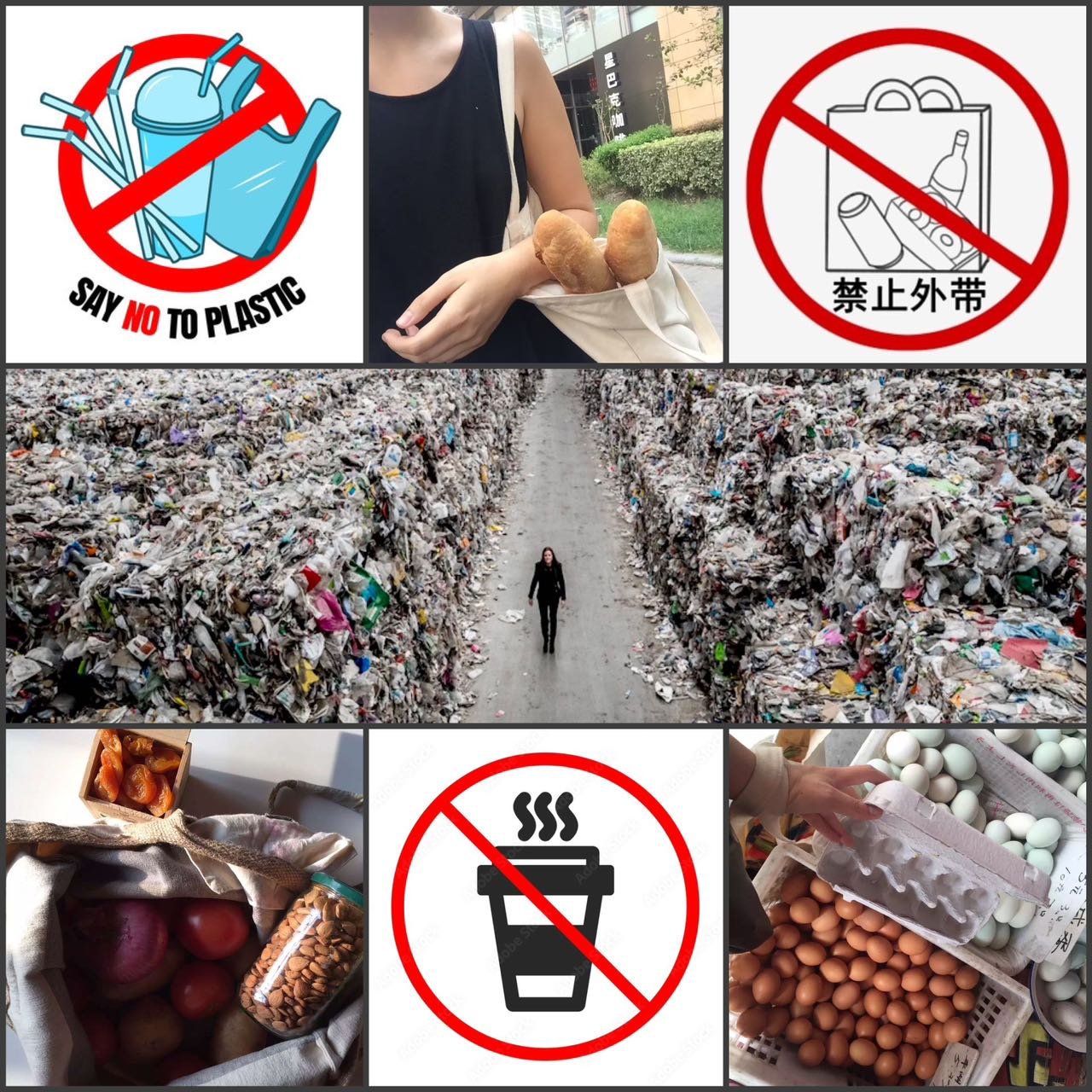
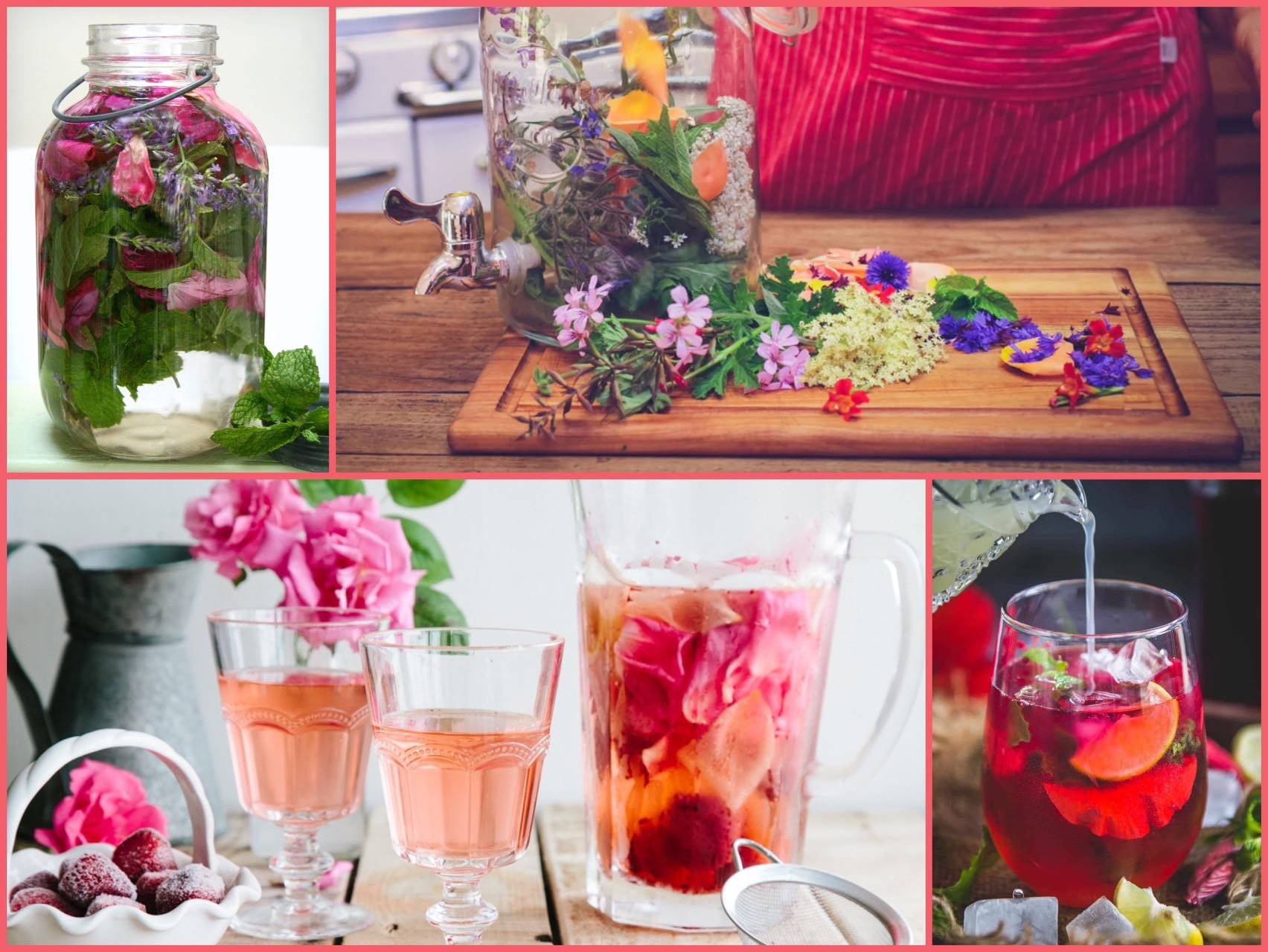
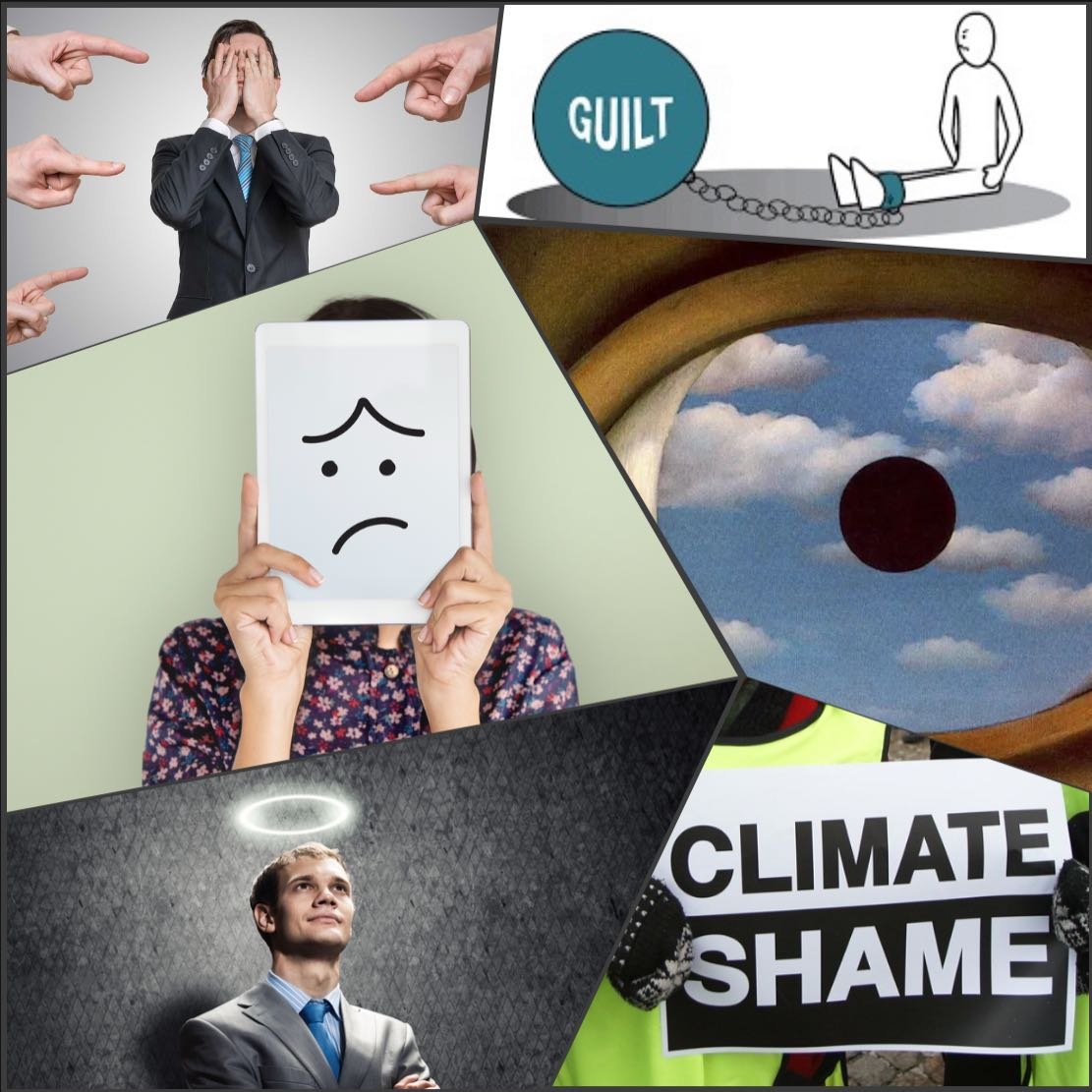
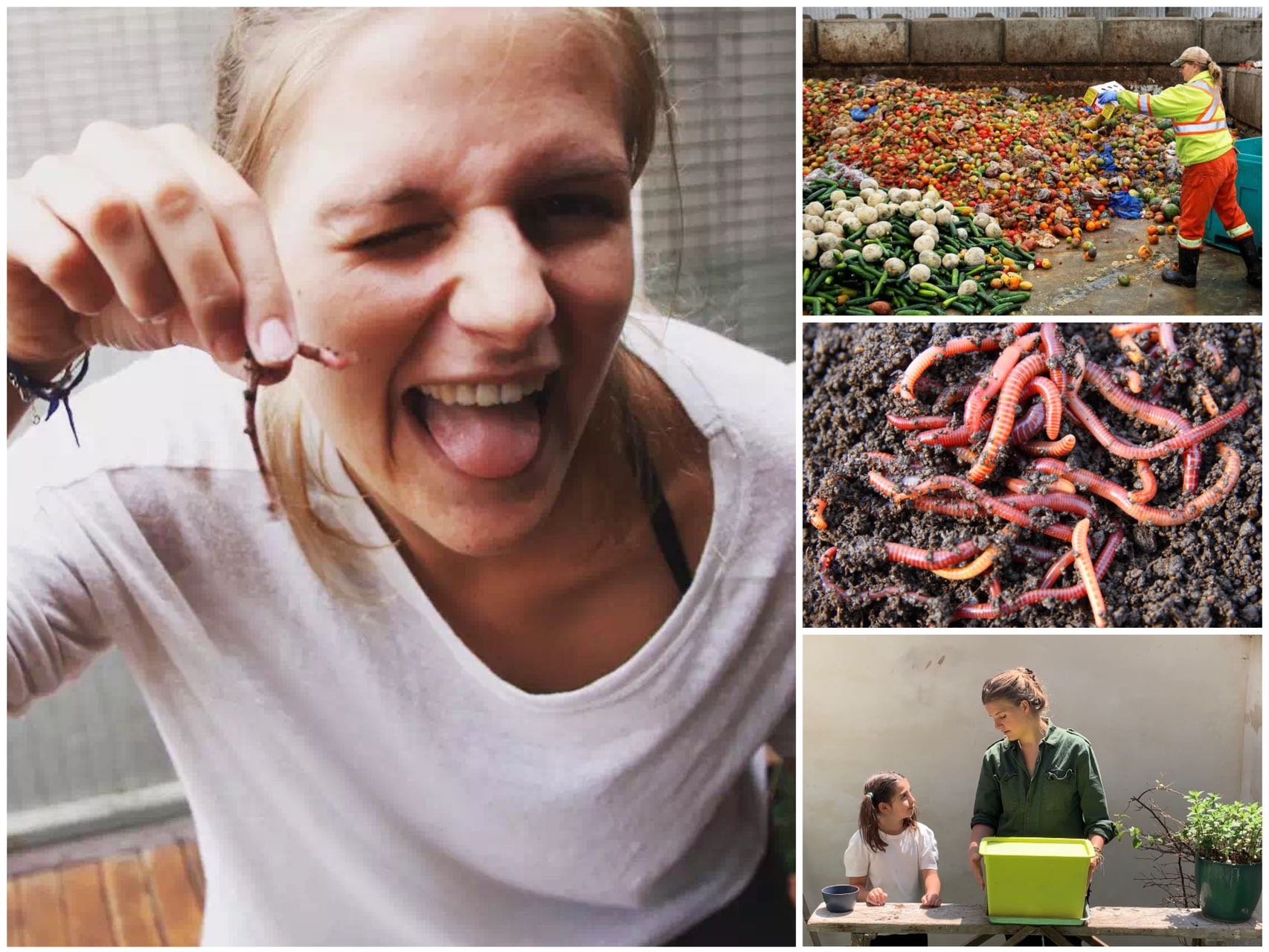
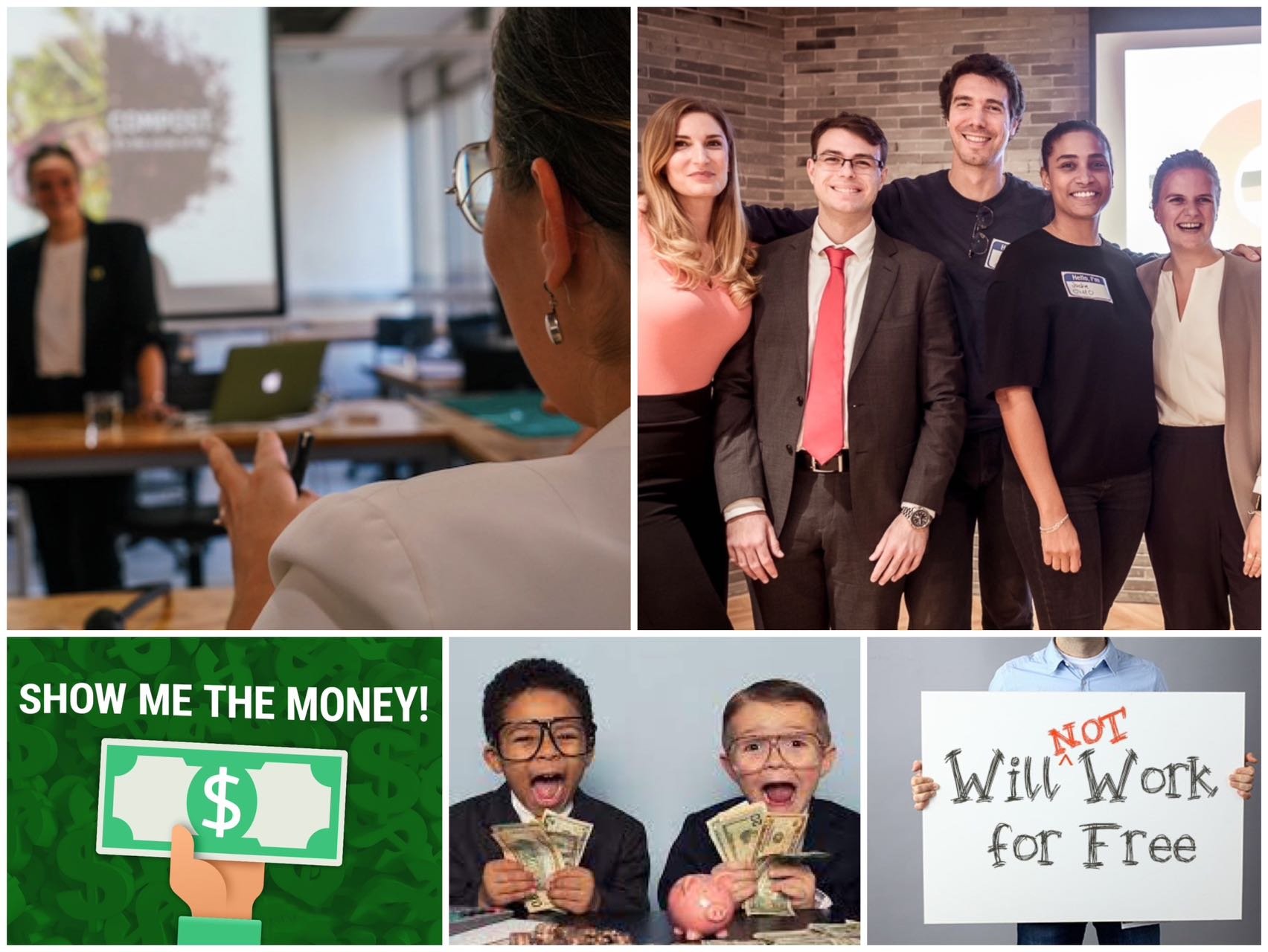
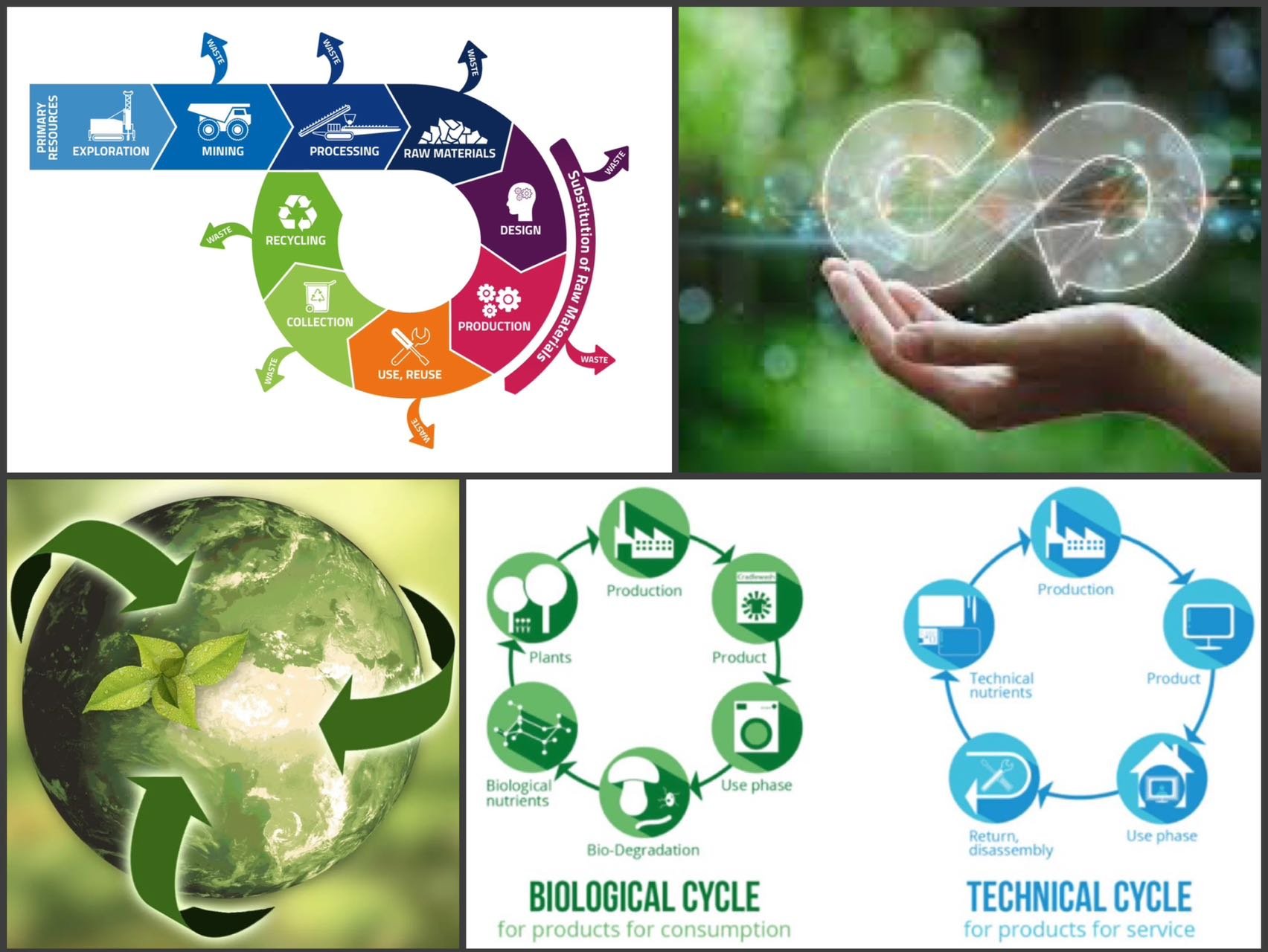
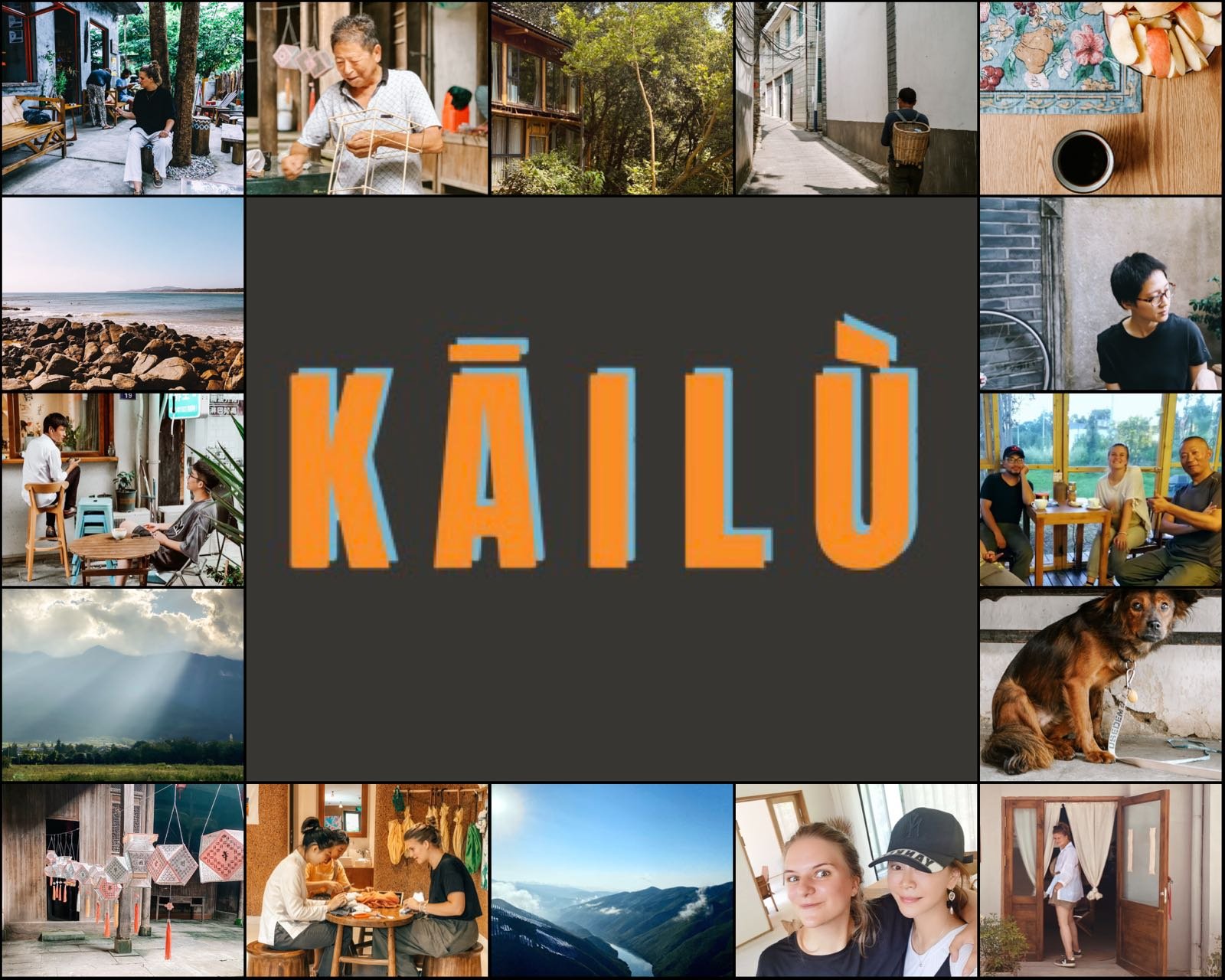
![Alizée Buysschaert's favourite China-related fact: 武則天 [Wǔ Zétiān]'s prosperous and stable reign as China's only empress in history, which was the same fact chosen by two previous guests on the show.](https://images.squarespace-cdn.com/content/v1/5d40122274f3720001d9543b/1670594411300-8SCHMMAWQE64KV2VXDJ1/CN+11477+s03e14+Aliz%C3%A9e+BUYSSCHAERT+E+Q01a+Fact.jpg)
![Alizée Buysschaert's favourite phrase in Chinese: 不卑不亢 [bùbēibùkàng], which means ‘not too arrogant, but also not too humble’.](https://images.squarespace-cdn.com/content/v1/5d40122274f3720001d9543b/1670594413154-H4W81EUO2PZETZG6Q782/CN+11478+s03e14+Aliz%C3%A9e+BUYSSCHAERT+F+Q02a+Phrase.jpg)
![Alizée Buysschaert's favourite destination in China: 大理 [Dàlǐ] in 云南 [Yúnnán].](https://images.squarespace-cdn.com/content/v1/5d40122274f3720001d9543b/1670594432405-SLGONQ6OGOMGSLACNT2C/CN+11479+s03e14+Aliz%C3%A9e+BUYSSCHAERT+G+Q03a+Destination.jpg)
![Alizée Buysschaert's best purchase in China: A ceramic plate from 景德镇 [Jǐngdézhèn].](https://images.squarespace-cdn.com/content/v1/5d40122274f3720001d9543b/1670594416320-0U5PI77JGR9WBVXY94TG/CN+11480+s03e14+Aliz%C3%A9e+BUYSSCHAERT+K+Q07a+Purchase+%28Best%29.jpg)
![Alizée Buysschaert's top inspiration in China: Her friend Rio from 大理 [Dàlǐ], who leads a creative, successful, natural lifestyle.](https://images.squarespace-cdn.com/content/v1/5d40122274f3720001d9543b/1670594417596-MUKBOVT6D8WVAPRRGIOF/CN+11481+s03e14+Aliz%C3%A9e+BUYSSCHAERT+M+Q10a+Inspiration.jpg)
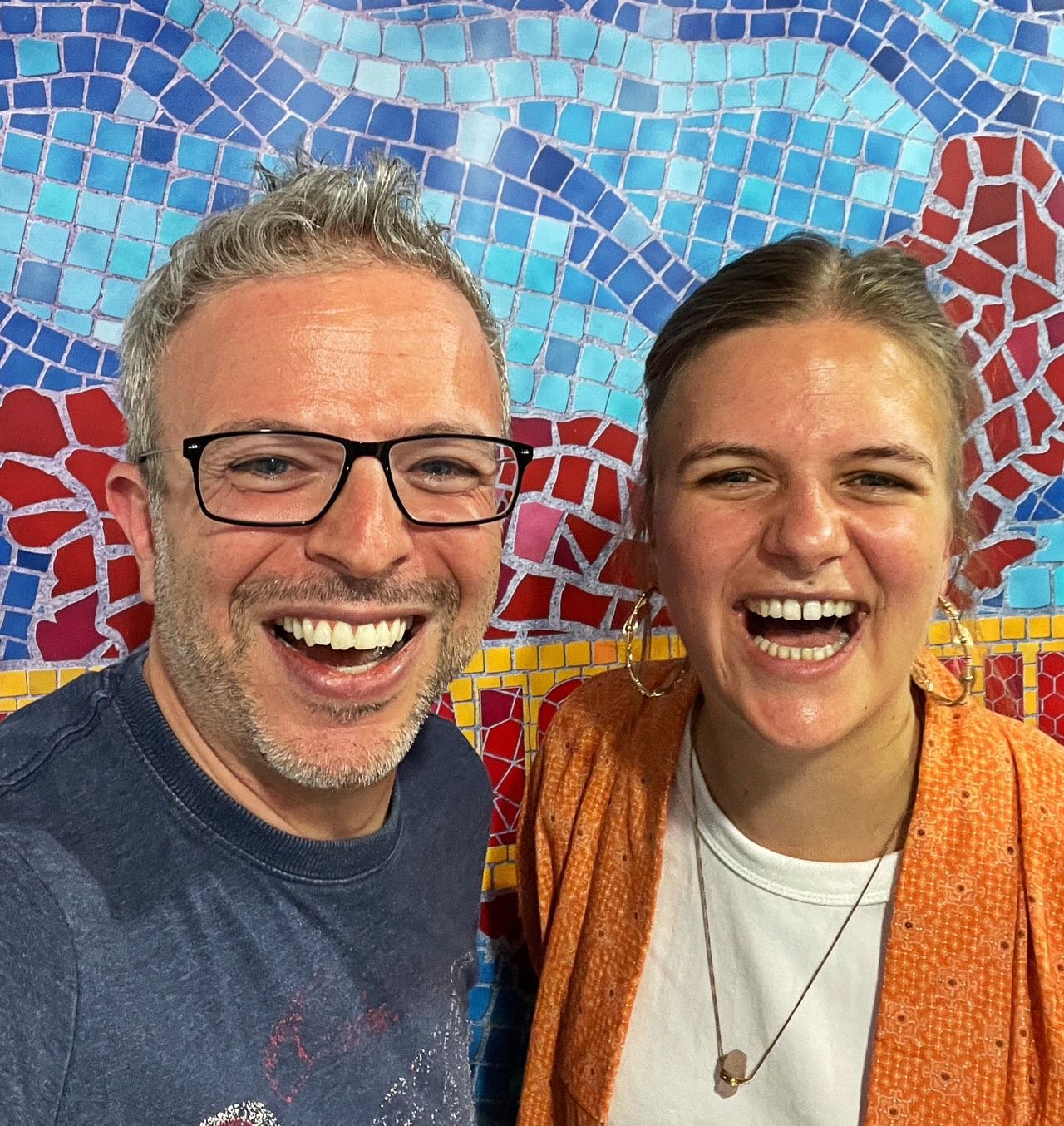
To Listen Here…
Click the ▷ button below:
To Listen/Subscribe Elsewhere…
1) Click the link to this episode on one of these well-known platforms:
2) Or on one of these China-based platforms:
To Read The Transcript…
[Trailer]
AB: Whenever I'm on stage, I look fly. You want to be my friend after I'm done talking.
[Intro]
OF: Welcome to Mosaic of China, a podcast about people who are making their mark in China. I’m your host, Oscar Fuchs.
The tone of so many of these episodes of Mosaic of China has been about starting new things, and the way in which the energy of China keeps propelling us forward. But if you’ve been listening carefully, you will also know that these aren’t linear stories of growth and opportunity, most of us go through cycles where we’re moving forward for a period, and then hitting roadblocks that make us pause, pivot and reinvent. As we’re coming to the end of the tumultuous year of 2022, I think a lot of us in China are only too aware of the highs and lows of these cycles.
My guest today Alizée is a perfect example of someone who speaks to these cycles, not just as a metaphor for what it’s like to live and work in China, but also in the way they describe the broader world of sustainability and our impact on the environment. If you’re anything like me, the moment you hear the word ‘environment’, you’re already hovering over the fast-forward button. Do I really need to listen to yet another person lecturing me about all the things I should be doing, and how humans have so utterly ruined the planet? Well do not worry, this is not one of those podcasts, and Alizée is not one of those guests. So stop hovering, and let’s start the show.
[Part 1]
OF: Thank you Alizée, nice to see you.
AB: Nice to see you too, Oscar. Really happy to be here.
OF: I purposefully just said your first name, because I have no idea how to pronounce your family name. So let's hear it from you.
AB: Alizée Buysschaert.
OF: ‘Buysschaert’.
AB: I said it in the French way.
OF: OK, so wait what is this name? It's a French name? No.
AB: Honestly yes, because I think the root of my family name comes from a small town in France called Buysschaert.
OF: OK.
AB: Because you know, I grew up in Belgium where we speak Dutch. So it's like ‘Buysschaert’ in Dutch.
OF: ‘Buysschaert’. It does sound like I'm swearing at you right now.
AB: Yeah!
OF: So shall I call you Alizée ‘Buysschaert’ or do you prefer ‘Buysschaert’, or what is it?
AB: The first one was actually perfect, great pronunciation.
OF: Thank you.
AB: Yes.
OF: ‘Buysschaert’. So you are Belgian, right? That’s where you come from.
AB: Yes. I grew up in many places - Ghent, Antwerp, Brussels - but all in the Flemish part of Belgium. Speaking French at home and then going to Dutch school. So I was raised with the two languages.
OF: And how is your Chinese?
AB: My Chinese, to speak, is not good. I speak like a five-year-old. But I understand it like a ten-year-old.
OF: Congratulations for making it to a ten-year-old.
AB: Thank you, thank you. I think the trip lately, it helped me quite a bit.
OF: Ah, well we're already going into your story. So before we get too far, I have to ask you the question: What is the object that you have brought that in some way represents your life in China?
AB: OK, so it's funny because when I chose the object, it actually made me think of something else that related to you.
OF: Oh, OK. Explain what that is.
AB: OK, so I brought a small death skull. This, for me, represents a story called ‘Skeleton Woman.
OF: ‘Skeleton Woman’?
AB: Yeah, it's an ancient story about death and rebirth, and how we all go through deaths and rebirths through our lives. For me, my life in China has been about birthing a person that I thought I wanted to be. And I am still partially that person. But afterwards it came with many small deaths of the person that I am not. And I think there's no better place in the world, according to me, to have this experience in such a short amount of time than in China. So yeah.
OF: And I'm trying to think what a skeleton woman has to do with me. You said it has a connection to me? What do you mean?
AB: The first time I saw you was on stage at Unravel. And it was actually, I think, about the Mexican holiday of ‘Day of the Dead’, where we honour the ones who passed.
OF: Wow! OK that's a nice reference. Well, you’ve said something which reminds me of the person who introduced you from last season, Katherine Wong.
AB: Katherine Wong.
OF: So let's listen to this.
[Start of Audio Clip]
KW: Definitely Alizée. She's a very special person. She's the founder of Zero Waste Shanghai.
OF: Zero waste, OK.
KW: It’s a movement that is I think, growing everywhere in the world right now.
[End of Audio Clip]
AB: So I met Katherine at a market, she was selling her candles. And we connected over her candles. And then, I don't know, I just love that person so much.
OF: Yeah.
AB: She is just so magical. We helped each other out a lot.
OF: Yeah.
AB: Yeah.
OF: And she's obviously here in Shanghai. Have you seen her recently?
AB: Yeah I have, I have. I've been in China for almost eight years. Most of that time, like my dear friend Katherine just said, I ran a company in sustainability called Zero Waste Shanghai, where I was supporting people and companies to move towards a circular economy. So I did this for six years.
OF: Right. The thing that I immediately think about when I hear someone talk about zero waste and sustainability is… “Boring!” Like, isn't this the problem? I don't want to hear it. I don't want to hear anything about this bloody environment anymore. I know! We’re killing the world.
AB: Yeah.
OF: How do you get around that immediate knee-jerk reaction?
AB: Well… OK so yeah, there are the people who don't want to hear about it. Believe me, the majority of my work, I've been amongst people like this. But I think I really saw sustainability as something cool. So when I'm on stage and I talk about it, you can feel the passion. And I think that's what changes the game. And then the way that I talk about it, I tried from the very beginning to stay away from the ‘hippie' thing. Like, “Don't buy anything. Look like trash, it's fine.” Like, I'm on the opposite of this. Whenever I'm on stage, I look fly. You want to be my friend after I'm done talking, that’s my goal. And it worked. I was very positive. I talk about the problems for maybe 15 minutes out of a one-hour talk. And then afterwards, I give you all the solutions that I see. “And this person did this; and this company did this. And how cool are they? And look at them” and blah blah blah. And making it inspiring, where people are like “Oh yeah, it's true!”
OF: Right. So you said for six years you had this company. So what was the company?
AB: It actually started with just me changing my lifestyle. I gave myself one year to reduce 90% of the waste that I produced every day. It was completely personal, I was working in a corporate company before.
OF: Uh-huh.
AB: And I started sharing this with my friends. And then my friends were like “Oh, this is cool.” And then we created this little group on WeChat. And then they started adding their friends. And then, I don't know, the group blew up. And people asked me for more and more content, and tips and things. And I just kept on giving.
OF: And you weren't even an expert, you just were doing this by yourself.
AB: I mean, I was doing my master’s thesis at the time on the circular economy in the fashion industry. And so I had quite a bit of knowledge on this topic already. And it's actually my frustration with the lack of action around the world that really made me start taking action within my own life. Because I thought "What can I do today - right now - to change that?”
OF: And so what was that first thing you did?
AB: The first thing I did was very simple. No more plastic bags, no more plastic straws, no more plastic takeaway cups, and no more take-out food?
OF: Actually, that’s quite a big step straightaway, I would say.
AB: I mean, at the time I was cooking quite a bit. Take-out was more a thing we did on the weekends. The thing in China is - I'm going to talk about 2016 China - like, organic food was just not available in China.
OF: Right.
AB: Even Chinese people did not trust Chinese organic food. Because there were many industries, and industries contaminate the water and the soils. So today, I would say I would trust it.
OF: A-ha.
AB: 2016, absolutely not. So at the time when I was doing zero waste, people said “I understand I cannot have plastic, but at the same time I need my vegetables - or my rice, or my quinoa, or whatever - to come from New Zealand or Australia or Thailand”.
OF: Oh I see.
AB: Even the filters, they did not trust the filters that today you can instal on your tap and your shower. They did not trust to drink the water from the filters.
OF: Yes.
AB: So they said “For me, the best thing is to buy bottled water for my kid.”
OF: Are you saying now that the filters are as safe as having bottled water?
AB: I think today there is no big difference indeed between bottled water and filtered water, because…
OF: Here in Shanghai at least.
AB: … Here in Shanghai, yes. Because to be honest, they're both water that has nothing in it. It has no minerals. So then what I say to my Chinese audience is “Add flowers to your water. Drink infused water.” Flowers contain so many great things, and - depending on the season - your body needs those things. For example, you would have hibiscus in your water in the summer, because it's really good for your skin. Now in this time, fall, you have Chinese dates. Otherwise, it's just liquid that doesn't add anything to your diet either.
OF: OK, gosh. I just know what's going to happen in this interview, I am going to get more and more upset with the things that I'm not doing. I'll try and keep those comments to myself. Wait so the idea is then, you have filtered water, you put it into a jug, and you infuse that with the flowers, and then from that jug is what you drink?
AB: Yes.
OF: Oh. Is it the case, then, that no matter where you are in the world, you should be doing this? Or is this specifically for China?
AB: I think it's anywhere you are in the world, you need this. To enhance the nutrients that you get out of these elements.
OF: Hmm. Do you have evidence about this kind of thing?
AB: Yeah, yeah, yeah. So I am no doctor, but I have read enough. And then for me very frankly, it's also common sense. Because today, you can find papers that argue both cases of anything.
OF: Yeah.
AB: Like, the biggest conversation in my industry is meat. To have meat or not to have meat. To be vegan or not to be vegan, right? There are so many documents and reports on both cases.
OF: That's what makes it confusing. That's what makes everyone think “Oh the whole thing's bull****, I’ll just do what I do.”
AB: And that’s fine. Like, when I go on stage, I say “Listen, the last thing that I want out of this conversation is for you to feel guilty. I'm just here because I'm sharing what I do. And you take whatever you want out of this.”
OF: That’s such a good philosophy, isn't it? Because if you look at the entirety of the problem, that's when you think “Eugh. Well you can't do anything, we might as well give up.” But I think what you say is correct. If you can focus on the one thing you can change today, then do that. And then maybe in a week's time - in a year's time, whatever - then do the next thing, right? That’s probably how you've done it yourself.
AB: No exactly. But also, start with the thing that you want to change. Don’t change things that you don't want to change. And definitely don't change purely out of guilt, because that guilt is only going to last you so long. And I'd rather you be half-perfect, but at least you can maybe inspire and convince others around you. That’s really all that I'm asking for.
OF: Mm-hm. Well let's get back to your story. So you were saying how you - first of all - quit those plastics. What was the next stage in your personal progression?
AB: So the next stage was changing small things such as composting. Composting became this next thing that I did, which honestly became the foundation of my business afterwards.
OF: Oh.
AB: Because within six months of me changing my lifestyle, I had F&B venues coming up to me saying “Hey, can you come to my space for free and do a talk, or an event, or a workshop?” And I had no idea what to share. So I went to the community on WeChat, and I was like “Hey guys, would you want a workshop or an event?” And everyone was like “A workshop!” And I was like "Cool, what do you want to learn?” And everyone was like “Compost bins for sure.”
OF: Is that right? Composting was so popular.
AB: And it's really not glamorous. I thought it was completely non-sexy. But it was something that everyone wanted to do. I thought I was going to do one workshop, once. But I started doing them every weekend. And then the people coming to my workshops would be managers, or CEOs.
OF: Ah.
AB: And then of course, when I start talking, I say, “Hi, my name is Alizée, I'm currently researching the circular economy.” So the people were like “Oh, she knows what she's talking about."
OF: Oh I see. So actually composting became the ‘way in’, for you to talk about bigger subjects as part of that demonstration.
AB: I mean, you give me a room with 25 people in it, I'm going to influence the room and make sure that they know more than just how to put worms into a bin.
OF: I mean, I love it. I love how this became your brand. You were the ‘composting queen' at that point.
AB: I was.
OF: OK!
AB: I still am. Food waste is a huge part of our lives. 35-40% of our waste is food waste.
OF: Is that right? Even with all the plastics?
AB: Yes, it's enormous. So when I was looking at how I could reduce more waste, composting was an obvious solution to cut it down by a lot.
OF: Right.
AB: And so I started looking into how I could do this in an urban setting. So I tried it out, I had some trial and error. But I put food in there, and then within month - or a month and a half - you have soil.
OF: Wow, which is basically worm poo.
AB: Basically worm poo. It's a small bin. It's about 40 centimetres long, 25 centimetres high, something like that. It’s a very small bin. And it has a tray under it, and you put some wet paper into it, add your worms, and then add some coconut fibre. And the worms will actually eat the paper and the coconut fibre brick together with your food, and their poop is basically the compost. And then you top it up with a piece of hemp. Because in summer, flies would come in. So basically…
OF: Yes! That's why I'm thinking, goddammit! I don't want a bloody box full of worm poo and flies in my house.
AB: So the thing is the compost bin does not smell. Because you will not be putting any dairy or meats in it.
OF: Oh so wait, no dairy, no meat.
AB: No dairy, no meat. no fish. No animal fat, no to anything too fried.
OF: Because that's what makes it smelly.
AB: That's what makes it smelly.
OF: “Nothing fried?” We're in China, Alizée!
AB: I know, I know. So the biggest question is 'Can we put oil in it?" I'm like “Well, if you're tossing a salad with olive oil, yes no problem. But if you're gonna have your 四川 [Sìchuān] hotpot / stir-fried noodles, like no.” There’s too much spice, too much fat, too much oil.
OF: That’s half of China right there!
AB: That's half of China. No, I know, I know. But if you have a very meat- and dairy-heavy diet, then I usually recommend people to have a ぼかし [bokashi] bin next to it.
OF: ぼかし [Bokashi], this sounds Japanese. What the hell’s that?
AB: It is Japanese. So ぼかし [bokashi] is a fermentation process.
OF: Oh.
AB: The lid is air-tight. Whereas in a compost bin, absolutely not, you need air in a compost bin.
OF: Otherwise, dead worms.
AB: Otherwise, dead worms. But also because of the process.
OF: Yes, yes.
AB: But in ぼかし [bokashi] it's air-tight, and you leave it like this for seven days, the food will be completely fermented. And then you can add this afterwards to your compost heap.
OF: And it won't smell.
AB: Exactly.
OF: OK.
AB: And then your worms can eat it.
OF: Right.
AB: But it’s an extra step.
OF: It’s an extra step. But that is a solution for people who eat meat, right?
AB: Listen, I have diehard believers in this concept, who have two ぼかし [bokashi] bins, five compost bins on their balcony. Like, they're on it. And their kids love it as well, because for kids they can see the process. That's also a great thing.
OF: Yeah.
AB: That’s why schools are a huge part of our work as well.
OF: Yeah, but you're making me light up like a child. Like, I want to see this too. I want to see these worms!
AB: No, everyone! Everyone wants to see them.
OF: Yes! OK, now I can see why it's popular.
OF: So I'm guessing then, this is when you started the company. Because you realises that there was a revenue stream in selling composting kits.
AB: Yeah, the composting kits were my bread and butter for the majority of my business life, because even when I was non giving them to people on weekends, other services became a spin-off of this one. Honestly, it has been our bread and butter.
OF: Can you put bread and butter into the compost bin?
AB: You can actually.
OF: Yes. Then that’s OK, you can use that metaphor.
AB: Yes.
OF: Yeah, I can see why. Because how else would you make money? You don't want to get paid, because you want to spread the word.
AB: No, that's not true, I want to get paid. I want to get paid. No, a thousand percent. I'm from a family of women entrepreneurs. Both my grandmothers and my mother are entrepreneurs. That's why the circular economy was so amazing for me, because it was the first time where I could see my love for the planet and business actually come together. And so when I started a company, I didn't have a choice, I had bills to pay. So if you want to hear me to speak - or if you want for me to come to your company - of course, you'll have to pay. But that’s something that I fought against very much in the beginning. Because I had clients just point-blank look me in the eye and be like “But why don't you do this for free? Like, this is something good.” And I'm like “OK, so large companies who are ruining the planet, it’s good for them to get paid a lot of money? But for me, who is trying to actually fix the problem, I should do this for free.?”
OF: Yes. Yes, what I said would have been quite insulting. “You want to do it for free?” No!
AB: No.
OF: You have to get paid.
AB: Of course.
OF: Yeah. You keep saying this phrase “circular economy”. And I do kind of know what it means, but it probably would be useful for you to define it.
AB: OK to explain the circular economy I have to explain to you what the ‘linear economy’ is first.
OF: Oh.
AB: The linear economy is an economy we live in today, which means we extract resources from the earth, we create a product - let’s say, my phone - I use it, and when I'm done using it, I toss it away. Our phones - or any product, for that matter - are not made to be recycled. Recycling is therefore today a very water-, energy-, and chemical-intensive process. It's messy. And so the circular economy is where, from the very beginning, the designers will think “OK, this phone belongs to us. So at the end of the user lifecycle, we need to get it back. And when we get it back, we need to be efficient. Therefore, we need to design it in a way that - when it gets back to us - we’re able to dismantle it really easily, so that we can keep up to 90-95% of the raw materials.” Therefore, companies are not reliant any more on the fluctuations of the raw materials markets, because it's really unsustainable. So what I really urge my clients is to say like “How can you become owners of the materials that you put out into the world? And if you own them, it means you need to get them back as well.” So now, instead of me buying my phone, you pay smaller fees over a time. But when you're done using it - when it's broken, whatever - I want it back. And so the concept of waste doesn't exist anymore.
OF: The concept of ownership doesn't exist anymore.
AB: I mean, yes, to a certain extent. I mean, again, in the circular economy there are two cycles. There are the technical cycles, and then there are the biological cycles. So for example, our clothes would be part of the biological cycles, because they're made from biological materials. For the biological cycles, we use the term ‘consumer’, because we ‘consume’ them. In the technical cycles, we use the term ‘user’ because we're ‘using’ them, but we're not ‘consuming’ our tech.
OF: Mm-hmm.
AB: Companies like Philips do this with lighting, other companies do this with their washing machines… Your car, I mean I work with car companies, and there's a big discussion about ‘What is the future for cars?’ Like, the loss of ownership. Again, there's no black and white. I want to own a car one day, because I love to drive. But if I'm in a city, I don't need to own a car, it’s so much trouble.
OF: Yeah. And so what's stopping us doing that now?
AB: Because we don't have the data right now.
OF: Data?
AB: Yes. The industry of sustainability is very young. And it's a process. It starts from the design of the products. But the design of the product has to work together with the people who are at the other end of that cycle, who are the recyclers or people who take it apart. So those two have to talk, which is why it's ‘circular’.
OF: And your job in this is like a conduit, right? You are the conduit?
AB: Exactly, yeah. I always hear about companies, startups… So if you need a connection to a network, I'm your person. I'm just like “Let's save money. Let's get to this quick. And let's have something that actually works. Because I don't want you to lose money or time. And I make it really sexy.
OF: Hello! OK. Let’s then go back to your story. So you had started off in not using plastics, you then went into composting. I want to know how far down this track did you go in your personal life?
AB: Ooh, I went very far. And I was not happy there at all.
OF: Oh, really?
AB: Yeah. I was brushing my teeth with powder. I was hardcore vegan. I was not buying anything, I was only buying secondhand. I was barely travelling. Then at some point, other people were challenging me. And then I was running a company, and people in the company were looking up to me. And then when I was out in public, you would never see me with anything that's not sustainable. You would never see me with any plastic beverage whatever, ever, ever. Because I was so conscious of…
OF: Yeah I mean, that's your brand.
AB: That’s my brand.
OF: Yeah, you would be a hypocrite if you did anything else.
AB: Exactly. When people see me at events, they ask me where I bought these things…
OF: Oh, just to test you.
AB: Yeah, yeah. They're like “So… your kimono right now…?”
OF: “Are you sure…” And you had to justify that, yeah.
AB: Yeah.
OF: You reach a peak. And then you said it, that you weren't happy at this peak?
AB: No. So I'm gonna admit it. I buy things because I like the packaging.
OF: Like anyone else.
AB: Like anyone else. I love to buy new stuff. And I'm a foodie. So if you and I are somewhere in 云南 [Yúnnán], and there's some amazing piece of meat that I have to try, like I'm sorry, yes I will want to try this. So I came to a point in my life were all the things I brought me joy, I took them away from myself. And so that's when I started allowing myself again to change. To be like “OK, I don't have to be this extreme person, because it's not helping me. And therefore it's not helping anyone else.” Because I think more people relate to me as being ‘not perfect’. So yeah, so today I say I'm ‘plant-based’, but I have meat occasionally. Not every week. But also if I see something nice in a store that I have to buy new, I will buy it new. If I forget my cup, I will - unfortunately, yes - take a take-away wake up. Do I do this daily? No. I am of course very conscious still. I still don't buy bottled water. I mean, of course, straws, plastic bags, small things like this. It's just, I'm not extreme any more.
OF: Mmm. We were talking about the circular economy. Let me take this conversation circular, right back to the beginning, when you said you've just come back from a trip. So what was this recent trip?
AB: So just like for many of us, 2020/2021 was pretty challenging. 2019 was our best year yet.
OF: As a company, you mean?
AB: As a company. We grew commercially, financially, so much. Like, we were ready for 2020 being the best year ever.
OF: Uh-huh. Guess what, I know the ending of this story.
AB: Mm-hmm. So my company has broken apart, I rebuilt it, broken apart, rebuilt it. So I was like “OK this is going to be another one of those episodes, where I have to break the company apart and rebuild it.”
OF: And reinvent it to something again. Like “Again, I have to put all this effort into it again.”
AB: Exactly. So it was very very difficult. And I came to a point where I was really depressed. “What am I doing? What am I doing it for?” Blah blah blah. We were talking about the skull, like ‘death and rebirth’, and that was a really big death for me. And then I was questioning myself, what is the one thing that I really wanted to do? And the only thing I came up with, was that I always wanted as a kid to be an adventurer. And you would either find me somewhere in nature, or you would find me in my van. And people said “Oh my god, you should do this.” And so we call the project ‘the KAILU project’. 开路 [Kāilù] means 'open road’ in Chinese.
OF: Ah yes.
AB: But also ‘blazing a new path.’ And…
OF: That's the beauty of Chinese, it can be interpreted in a very deep way if you want it to, right?
AB: Exactly. And the thing is, I've made many friends in the sustainability realm in China. But those people don't live in Shanghai.
OF: Yeah.
AB: They live across the country. And I always said "If I can one day do something with them, it would be so cool”. And then the idea came to create a documentary series where I would be living in my van. I didn't end up going with a van. Because I had to build it myself - the interior, that is - and it would have taken me 2-3 months. So I rented out an electric car, and I drove around China for two months to go and meet people - my friends, basically - who do really cool things in sustainability who have built a community around this. So I went, I travelled, and I sat down with them, and I interviewed them. I made short video clips, and I'm publishing this on YouTube, WeChat, Instagram. Then afterwards, I would love to take KAILU outside of China.
OF: Nice.
AB: And keep doing this, and this be my life's work. To really just go and meet people. Because this is truly who I am. I am someone who needs to be outside, I love connecting with people, I'm curious. What makes me happy is to be in a van, waking up, and going to meet people who are so freaking interesting. Basically your job, almost.
OF: I'm thinking, this is like a mix between what I'm doing and Greta Thunberg. So you're like a nicer, less selfish version of me. Yeah, totally. And I can see how this is an extension of what you're already doing, because you are giving presentations. Which is you, and you're being very inspiring. But then if you can get somebody else's story as part of that, it helps to amplify and magnify the inspiration. I can totally see how it would work.
AB: Yeah, exactly. And right now it's done. I'm back in Shanghai, because I'm still interviewing people here as well.
OF: Aha.
AB: And this is just the beginning. I feel like now I'm scouting, testing the thing out. But man, if this could be my full time gig, that'd be amazing.
OF: Yeah. Well, that's the ultimate luxury, if you could do that - which not just speaks to your own passion, but also speaks to saving the world, and at the same time is something which is sustainable from a financial perspective - then that’s it, baby.
AB: That’s it.
OF: I wish you all the best. What you are doing - what you have done - is to try and make this topic - which is annoying and boring - you’ve tried to make it sexy and inspiring. Being in your company, I can feel it. Thank you Alizée, we’ll move on to Part 2.
[Part 2]
OF: Alright Alizée.
AB: Yes.
OF: It's the 10 questions. So I ask every guest these same 10 questions. So we will start now. Question 1, which this season is brought to us by Shanghai Daily: What is your favourite China-related fact?
AB: There was only one female empress who ruled in China, 武則天 [Wǔ Zétiān]. And during her reign, China was pretty prosperous and stable. And I love that.
OF: Female rulers. You know what, you're the third person to say that as their favourite China fact.
AB: Shut up.
OF: Yeah.
AB: Love it.
OF: In Season 01 it was the comedian from Inner Mongolia, Maple Zuo. And in Season 02 it was the heavy metal bar owner Cassandra Chen. So you are in good company. She is her own empress right now. The composite empress.
AB: I am.
OF: Question 02, which is brought to us by Rosetta Stone: Do you have a favourite word or phrase in Chinese?
AB: Oh yes. I mean, I use 可以 [kěyǐ] even in Belgium. But no, my friend Myles in 甘肃 [Gānsù] taught me 不卑不亢 [bùbēibùkàng].
OF: 不卑不亢 [bùbēibùkàng].
AB: It means ‘not arrogant, but also not too humble’. It's the right balance between being a proud person, but not arrogant.
OF: I like it. And does this encapsulate what you do as a person? Or who you are?
AB: I don't think I would manifest my pride out in public, but it's definitely sometimes in my head.
OF: Yeah.
AB: So I think for me, it's just a good reminder to be like “You're no better than anyone else. No one else is better than you. Just do what you have to do.”
OF: Yeah. What is your favourite destination within China?
AB: 大理 [Dàlǐ] in 云南 [Yúnnán].
OF: 大理 [Dàlǐ].
AB: 大理 [Dàlǐ]. If I have to settle somewhere, I'll be going to 大理 [Dàlǐ]. It's the perfect place of creativity, entrepreneurship, nature and the luxuries of Shanghai.
OF: Oh it has luxuries of Shanghai?
AB: Uh-huh. Coffee shops, bakeries, cute stores, nice little restaurants.
OF: Yeah.
AB: It’s very comfortable. It’s like a tiny tiny Shanghai, in between a lake and the mountains.
OF: Mmm. Very nice. Zhang Yuan - he is a curator of a museum, he does performance art - and he was saying that he liked 大理 [Dàlǐ] last season because the people think differently, he was saying. The people are a bit more artistic, and the clouds are always there. So it has this kind of mystery about it, 大理 [Dàlǐ].
AB: Absolutely agree. Everyone there is an artist. The creativity is like a skyrocket. And they're making money, and they're living an amazing life.
OF: Nice. Next question. If you left China, what would you miss the most?
AB: I would miss my life as it is right now, the most. With the friends that I have, the lifestyle that I have, the person that I am. I've had the experience when I'm outside of China that I lose a connection with myself. It's difficult to keep that alive, especially when I'm in Belgium. When I'm in Dubai or Thailand, I get it. The connection is still there. But when I'm in Belgium, it's difficult to grasp that person.
OF: I know exactly what you mean. You kind of feel like you regress, don't you?
AB: Exactly. That's exactly how I feel.
OF: OK, next question. Is there anything that still surprises you about life in China?
AB: Yesterday, I saw a child pooping in the middle of a pedestrian street. Pooping. Like, I’d seen peeing before. But pooping. It… it really disturbed me.
OF: That's rare these days, right?
AB: It’s quite rare. And again, it's the poo thing. I’d never seen pooping before.
OF: I wonder if it actually was a tourist?
AB: For sure. 静安 [Jìng’ān] Temple, right there in the middle.
OF: Oh. There you go. Oh wow. Yep, that would be a surprise. Next question, which comes from SmartShanghai: Where is your favourite place to go out, to eat or drink or hang out?
AB: My favourite place to drink and hang out is The Room. It's a small coffee shop on 泰安 [Tài’ān] Road. Very cute, very nice, they have the most amazing lemon scones. Yeah, I'm not a party animal. So I don't drink as much. And otherwise food-wise, anywhere with 云南 [Yúnnán] food, 东北 [Dōngběi] food. I don't have a specific place, to be honest. I love to try new things.
OF: Yeah. What is the best or worst purchase you have made in China?
AB: OK. So the best purchase is for sure one of my ceramics. I bought so much ceramic.
OF: Is there one particular one?
AB: Yes, there is one plate that I bought in 景德镇 [Jǐngdézhèn], which is black and has some gold on it. It’s that plate for sure. 景德镇 [Jǐngdézhèn] is famous for ceramics, it's where the royal kilns used to be, thousands of years ago. It's the place where you go for the best porcelain, the best ceramics in China. I mean, the city is not beautiful. They're working on it. But there are so many artists studios that are just in these old little houses. It's a goldmine.
OF: Thank you. Now the next question, what is your favourite WeChat sticker?
AB: The one where Adele is laughing so hard, and she falls on her face on this couch. It's just my favourite.
OF: That’s a good one, I've never seen that one.
AB: You’ve never seen that one?
OF: Where have I been?
AB: Oh it’s so good. Just watching it makes me happy.
OF: Thank you.
AB: You’re welcome.
OF: Next question. What is your go-to song to sing at KTV?
AB: ‘I Want It That Way’ by the Backstreet Boys.
OF: Ah!
AB: That song was on the first CD that my dad burned for me.
OF: Oh nice.
AB: Yeah. I don't know. I just feel so much love and joy. And it's romantic. And it’s… Ach. It’s so cheesy, I love it. It’s like “You are my fire”. Its so good, you may catch me on my scooter singing this full-on.
OF: Oh god.
AB: Honestly, I sing on my scooter. I'm just like “Na na na!” Cos I don’t care.
OF: Who needs KTV, right?
AB: Exactly.
OF: And finally, who or what is your best source of inspiration in China?
AB: I want to say the people that are interviewed. Because I have a crush on a different person every couple of months. So right now I'm really really inspired by my friend Rio from 大理 [Dàlǐ], who I interviewed recently. She is just a creative, an entrepreneur, someone who lives outside in nature. And I'm like “You are my vision of success”.
OF: Well on that note - especially looking at your object still on this desk, which is the birth, and the death, the rebirth - maybe it's time for a rebirth, I'll see you in 大理 [Dàlǐ] at one point.
AB: Let’s do it.
OF: Thank you so much, Alizée.
AB: No, thank you Oscar. I honestly had such a good time with you today, it was amazing.
OF: Oh yeah, we could still keep on talking. But I have to let you go. Before I do, the last thing I will ask before you leave is, out of everyone you know in China, who do you recommend that I interview in the next season of Mosaic of China?
AB: Definitely I would recommend Shutong, 刘疏桐 [Liú Shūtóng]. He is an entrepreneur - I think he's now based in 南京 [Nánjīng] - who turns cooking oil into biogas/biodiesel.
OF: Oh.
AB: And he's doing this in collaboration with the 南京 [Nánjīng] government and large companies. He is very inspirational to me, in our industry.
OF: That sounds great. And if there was one question that you would ask him, what would you ask?
AB: I would ask him what is something that he does daily that contributes to the way he works?
OF: I like it.
AB: Yeah
OF: Thank you so much Alizée.
AB: Thank you Oscar.
[Outro]
OF: Well, the theme of death and rebirth has continued for Alizée, who is now based back in Belgium. As you heard in the episode, in the past she had always felt strange going back to her home country when she visited from China. But I’m happy to report that she hasn’t lost touch with her true identity, and she’s enjoying a new role combining her twin passions of the environment and content creation in Antwerp. We’re sorry to see you leave Alizée, but at the same time looking forward to see what you do next.
Speaking about the theme of birth and death, Alizée mentioned the connection to my appearance at the Unravel storytelling series. You can type in the search terms ‘Oscology’ and ‘Remember Me’ and the YouTube video of that story should pop up. Alizée’s channel ‘KAILU, The Open Road’ is also there. And while you’re online, also check out all the graphics that go together with today’s episode, either on mosaicofchina.com or on social media.
That’s where you’ll also find information on how to subscribe to the PREMIUM version of the show, where there are extended versions of all Mosaic of China interviews. Alizée’s is no exception, here are a few clips from today’s full-length conversation:
[Clip 1]
AB: I came in right before they closed the borders.
OF: Ooooh.
AB: Like, 48 hours.
[Clip 2]
OF: When you talk about kombucha, come on, this is like ‘hipster central’ now.
[Clip 3]
AB: I'm sorry, I'm trying to survive here. Please go give your talk somewhere else.
[Clip 4]
AB: When we touch dirt, there's a happiness.
[Clip 5]
AB: “Time to clean up the beach.” And I'm like “What? No, we’re on a holiday!” He was like “We're going to clean up the beach.”
[Clip 6]
AB: If there's one thing I would say: “Please please please, separate your food waste from everything else.”
[Clip 7]
OF: Everyone in China, Scooby-Doo.
AB: Yeah, exactly.
[Clip 8]
AB: Smaller, and cooler, and cuter, and fantastic.
[Clip 9]
AB: Can I touch the worms?
[Clip 10]
AB: She warned me “You're going to cry this evening.” And I cried. And it was amazing.
[Clip 11]
AB: If you go vegan and you are sick as a dog, go back to eating meat.
[Clip 12]
OF: It’s so different to life in China, it would be like ‘the antidote to China’ at that point.
AB: Yes, 100%.
[End of Audio Clips]
OF: Mosaic of China is me, Oscar Fuchs, with artwork by Denny Newell. Earlier on, we heard the voice of Katherine Wong from Season 02 Episode 04 recommending Alizée to the show. After the music you’ll hear a short catch-up with Katherine, and then another catch-up with the person who referred Katherine, that’s Angie Wu from Season 01 Episode 18. It’s great to have these three people connected through the Mosaic, their stories are so distinct yet feature those themes of birth and death - invention and re-invention - that Alizée described so well. Speaking of which, we’re about to say goodbye to another year, so I’ll see you here next week for the final episode of 2022.
[Catch-Up Interview 1]
OF: Katherine, hello.
KW: Hello Oscar!
OF: When I first met you, you were in Shanghai. Then you travelled back to Peru, where your parents live. And that was when the world shut down the first time around. And you were stuck in Peru at the time.
KW: Yes. It was this big uncertainty, not knowing when I will be able to come back. I was always trying to get this humanitarian flight all the time.
OF: Yeah.
KW: After three or four attempts, I managed to get a humanitarian flight to go to Germany, because that's where my husband is from. And in Germany, I experienced another lockdown again.
OF: Oh god.
KW: So it was the end of 2020 when I was able to finally come back home.
OF: So actually, you were locked down in three different continents.
KW: Yes, that's true.
OF: So you were in Peru, and that was with your mother and father, and your son.
KW: Yes.
OF: And then in Germany, you were with who?
KW: I was with my father in law, who speaks mostly German.
OF: Oh.
KW: And I don’t.
OF: That was how many months?
KW: Around 3-4 months.
OF: Yeah. And your German husband, he was in Shanghai the whole time.
KW: Trying to get us back.
OF: So out of the three - Peru, and then Germany, and then here in Shanghai quite recently - what would you say was the hardest one?
KW: That's not a tricky question, I would say this one definitely.
OF: The one in Shanghai.
KW: Yeah. I mean, the fact that you live in fear of not being able to have enough food, that was really tough.
OF: Yeah. Well, thankfully, it's in the past for us right now. Maybe it's a good chance for us to pivot this conversation to what you do. So for people who haven't heard your original episode, you are a healer, right?
KW: Yes.
OF: And you use traditional Peruvian techniques, and you also sell products as well. Why don't you give us an update on your business then, since you got back to China.
KW: Yes. So I planned to take things slowly, but the universe don't want that to happen to me. I started to have people coming to me - they need help, they want sessions - and I couldn't say no.
OF: Yeah.
KW: So it's been the busiest of all my time as a practitioner.
OF: Really?
KW: Yes.
OF: And what do you think was the reason?
KW: The spiritual awakening of people. The realisation that you need to feel good in your mind. You need to be balanced, so you are able to make the right and the best decisions in your life. To learn and realise about energy, or about your soul, or spiritual growth.
OF: Mmm. And you were saying, even back in our interview, that you were getting more and more Chinese customers. Is that what happened?
KW: Yes.
OF: And so do you also use crystals now? I remember, that was your object from our original interview.
KW: Yes. Every time, in all my sessions. It works to awaken our heart, for us to remember who we are, why we're here on earth, what are our skills in this lifetime, or our purpose. I think it's something very easy to find, and very easy to use as well.
OF: I mean, I'm still on the side of “Well… Does it work, does it not? I'm not entirely sure." But I can certainly see how people who believe in it, they do definitely feel better afterwards. So I should basically do more myself, shouldn't I?
KW: Yes.
OF: You did give me, very kindly, one of your flower-scented candles. And I must say, it did feel very nice when I used it. So I'm still open minded, let’s put it that way. Thank you again, I want to say thank you also to Angie, who first introduced you to Season 02. You're very close friends, are you still in touch with her?
KW: Yes. Still. Always.
OF: Yeah. And the person who you referred to for Season 03, our good friend Alizée.
KW: Yes. It's sad that she left, but I guess that's the life here that we live now in China, right? In Shanghai.
OF: Yes. You've been here … what is it, eighteen years now? Nineteen?
KW: Yes, eighteen years.
OF: Yeah. So what are your plans for the future?
KW: At some point, we will be moving.
OF: Oh!
KW: We have no date. But we will move. We will move.
OF: And do you know where?
KW: Most likely Germany.
OF: I guess that makes it a little bit easier for you to return to Peru as well. You're already halfway there, if you're in Germany.
KW: Yes. It's not gonna be 24-hour flight.
OF: Well, that's sad news I'm sure for the people who know you here in Shanghai. But I feel quite lucky that I have you in this window before you leave. So at least we can meet up in person.
KW: Yes.
OF: Especially since last time it was over Zoom.
KW: I know. Yes.
OF: Let’s promise that we will try to keep in touch every year, because who knows where you'll be next time.
KW: Yes.
OF: But you’ll always be a part of this Mosaic, so thank you again Katherine.
KW: I'm grateful for you. Thank you Oscar.
[Catch-Up Interview 2]
OF: Hello Angie.
AW: Hello Oscar.
OF: To anyone who does not know you, you are a jewellery designer.
AW: Yes.
OF: And you also make it yourself.
AW: Yes.
OF: And then you sell it. You are the A-Z of jewellery in Shanghai.
AW: Yes. That's why I'm so tired.
OF: Last time I saw you - in this room, when we recorded your first catch-up - I was very surprised by your energy. You were so much more relaxed, just lighter than you were on the first time that we talked. And then now it's even more the case. So what has happened?
AW: Oh, when was the last time we met. Which year?
OF: I think the first interview was three years ago.
AW: Yeah, that I know.
OF: And then the catch up was about 18 months ago.
AW: OK. I got a wake up call in 2022. My nature hasn’t changed. So yes, when I first see you - the first 5-10 minutes - I’m just like a speedy bunny. I’m super fast, and super energetic. What really changed is that I am resolved, inspired and hopeful for the next chapter of my life. I'm going to be 47 in two weeks. And I just feel like it's gonna be the best age of my life. And for many many years, I lost that.
OF: Yes.
AW: In order to keep my business alive, I became a working machine. I work Monday to Sunday, I have this sense of duty, and I want to be worth my clients’ trust. Shanghai, it's energetic, it sucks you in, and you are in the washing machine.
OF: Exactly.
AW: You know how it feels, right?
OF: Yeah.
AW: It’s exhausting, but very interesting too. But then when the lockdown happened this year, 70% of my expat customers are leaving China for good. This year is the first year that all the small businesses in Shanghai were hit like a tsunami.
OF: Yeah.
AW: And the ones that are still here since 2014, are the ones who put in everything: all their savings, all the effort, all the time. Because we are devoted to this business. And this year, I thought I wouldn't survive. So I made six plans, of different scenarios and different possibilities. I was like “OK Angie, you have to choose. And stick to it.” And that's it. And so I chose. And from that moment on, I stopped being scared, I stopped being insecure, I stopped being a control freak. And I see the world in a brand new way.
OF: And now you're just focused on executing this plan.
AW: Execution. So I started to sit down, and started to write a ‘to do’ list. Doing that makes me feel that I’m going forward.
OF: Yes, and you have control over it, in some way.
AW: I have control over what to pack.
OF: Yes.
AW: I have control over what shoes to keep.
OF: Yes.
AW: So these little things that I put on my to do list, every single tiny one makes me feel good.
OF: Yeah.
AW: And I stopped having nightmares, I stopped reading news.
OF: Yes. Well that's definitely healthy.
AW: I know that if I think enough, I can break through. And I did.
OF: Amazing whatever you did, it works. Because I can tell.
AW: It worked, it worked.
OF: So what is the plan then?
AW: So I will find the next place I want to live. My studio in Shanghai stays. China will become my retail hub, and I will participate in exhibitions in all the major cities in Europe and North America. I think it will take a few years to build that in Europe and North America, but I know I can make it.
OF: Well, you had such an international client base.
AW: Yes.
OF: A lot of those people have now left.
AW: Yes.
OF: And they are in these cities around the world.
AW: When I told them I'm going to set up my studio in Europe, they were like “We will visit you!”
OF: Exactly.
AW: And I’m like “Of course”.
OF: You’ll do it.
AW: Yeah.
OF: I have every faith. Angie, it's a pleasure to see you again. I'm very happy that you came into my life through this project, and let's stay in touch.
AW: Likewise. We meet again. China will open up again.
OF: Yeah.
AW: And I will be back!
